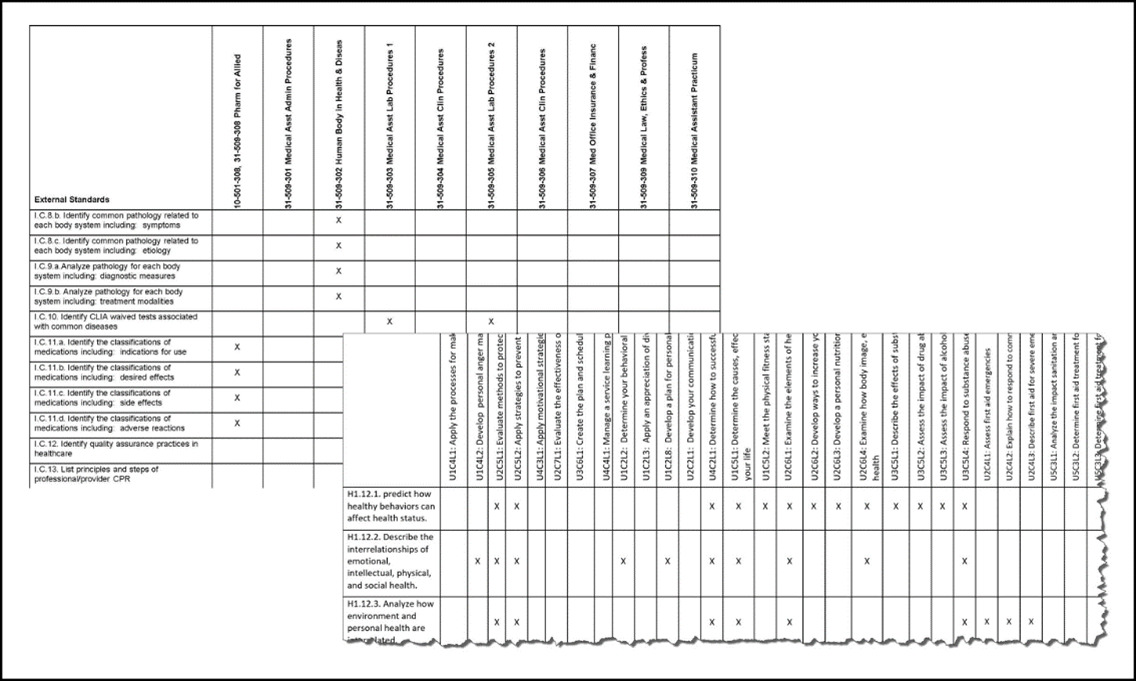Standards Alignment with WIDS
Aligning programs and courses to national academic or occupational standards can add credibility and accountability to your curriculum by providing an objective third-party benchmark for what you are teaching. For example, if you are teaching a Grade 10-11 Math course in the U.S., you might align your course to the Common Core Math Standards for those grades. If you offer a post-secondary Medical Assistant program, you might align to Medical Assisting Education Review Board. Once you associate the appropriate standard set with a course, you can align individual standards with course competencies. In both examples, standards alignment gives you a different view of what you are teaching and where you might have gaps in your plan for learning.
How WIDS Helps with Alignment
WIDS consultants have helped educators align their content to standards for K-12, military, academic, and occupational programs. Through a careful analysis of course learning activities and assessments, WIDS consultants determine if a course supports or meets a standard set, and which activities support often broadly written and abstract standard language. An individual activity might not meet a standard, but several standards grouped as a whole may fit the bill. This is where WIDS expertise can help make an objective determination.
At the outset, WIDS consultants help determine the most appropriate standards set to apply and then level the standards for linking. Some standards are not written to apply to only one course. Therefore, in many occupational programs and courses, standards linking can expose critical gaps allowing for revised activities and assessments.
 Clients who use WIDS software can complete standards linking on their own. With WIDS, you can import whole standard sets with one click. Once the standards are in WIDS, you can link them to your programs and courses. Then, you can link standards to WIDS course outcomes for a more detailed curriculum map. Finally, you can export or print a crosswalk of the outcomes to the standards you linked in WIDS
Clients who use WIDS software can complete standards linking on their own. With WIDS, you can import whole standard sets with one click. Once the standards are in WIDS, you can link them to your programs and courses. Then, you can link standards to WIDS course outcomes for a more detailed curriculum map. Finally, you can export or print a crosswalk of the outcomes to the standards you linked in WIDS
Linking Occupational Standards
WIDS has consulted with a variety of occupational organizations to meet national and state standards requirements for programs and courses For example:
-
Care Coordination Systems (CCS) in Akron, OH used WIDS to align their program to the Community Health Worker Core Consensus Project and 10 sets of state standards. WIDS consultants supported CCS in designing and developing standards-driven curriculum for their Community Health Worker training program.
- Dairy Grazing Apprenticeship (DGA) organization contracted with WIDS to have their online educational portion of the apprenticeship recognized by several states. This work involved aligning the program to Department of Labor standards for the Dairy Grazier Apprenticeship.
- Wisconsin Technical College System (WTCS) has contracts with WIDS each year to update occupational program curriculum. For state-aligned programs, this involves consulting with teams of program faculty representing all 16 college districts and facilitating projects to align programs with national standards
Linking K-12 Academics
National K-12 programs rely on standards alignment to verify the credibility of academic content. In some cases, this means aligning both state and national standards to a program or course. WIDS has consulted with a number of clients to align national standard sets to national curriculum. For example:
- Boston Public School System – worked with WIDS to map course learning objectives in 70+ courses to Common Core standards throughout the K-12 curriculum for their Arts Program courses. The mapping was documented in the WIDS software.
- Johns Hopkins University Center for Talented Youth (JHU CTY) employed the WIDS team to map more than 100 courses to several national K-12 standards and College Board AP course standards. WIDS generated template analyses for CTY course experts to affirm standard connections and recommend activity or assessment modification for alignment. Additionally, WIDS consultants linked? course items to standards in the CTY’s Moodle platform.
- Army JROTC worked with the WIDS team for a revision of their high school program curriculum. As lead instructional designers on the project, WIDS met the client goal of continuous improvement of student learning with more rigorous academics. The project included aligning more than 100 lesson outcomes to national standard sets. The standards mapping was documented in WIDS software which generates crosswalks for their national curriculum guide and accreditation requirements. Similarly, WIDS has collaborated on standards alignment for the Air Force and Navy JROTC curriculum
In summary, aligning your curriculum to national standards provides credibility and documents accountability. Experienced WIDS consultants bring a neutral third- party perspective to the alignment process and offers focused recommendations for standards-driven curriculum improvements.
Download a free sample of a WIDS Curriculum Map.
For more information on how WIDS can assist you with your standards alignment project, contact us at info@wids.org.
4585